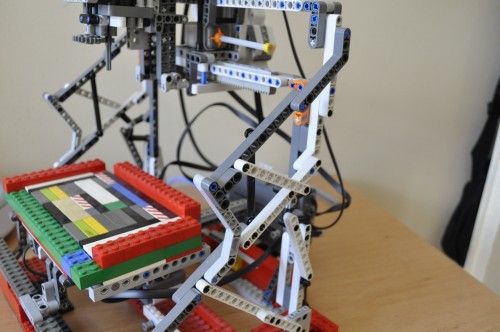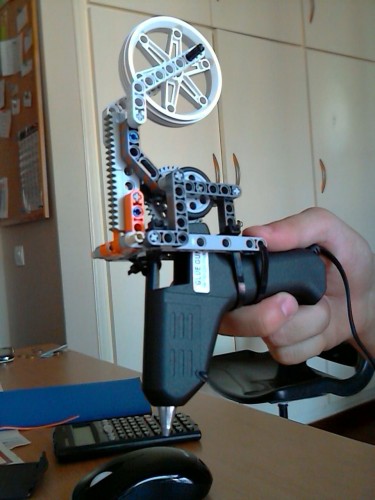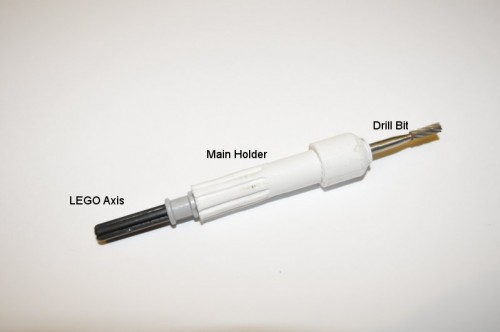- How to Adjust X and Y Axis Scale in Arduino Serial Plotter (No Extra Software Needed)Posted 3 months ago
- Elettronici Entusiasti: Inspiring Makers at Maker Faire Rome 2024Posted 3 months ago
- makeITcircular 2024 content launched – Part of Maker Faire Rome 2024Posted 5 months ago
- Application For Maker Faire Rome 2024: Deadline June 20thPosted 7 months ago
- Building a 3D Digital Clock with ArduinoPosted 12 months ago
- Creating a controller for Minecraft with realistic body movements using ArduinoPosted 1 year ago
- Snowflake with ArduinoPosted 1 year ago
- Holographic Christmas TreePosted 1 year ago
- Segstick: Build Your Own Self-Balancing Vehicle in Just 2 Days with ArduinoPosted 1 year ago
- ZSWatch: An Open-Source Smartwatch Project Based on the Zephyr Operating SystemPosted 1 year ago
Lego 3D Printing-Milling Machine
Web site:
https://code.google.com/p/lego-mindstorms-3d-printing-machine/Project Summary:
This is a project aims to develop a special 3D printer made of LEGO Mindstorms(R) pieces. Inspired by the GNU RepRap 3D Printer (open-source based 3D printer) and Arthur Sacek's Milling Machine, this project combines both techniques resulting in a machine that, even though resembles the RepRap design, it drills floral foam so as to make three dimensional objects. However, LEGO, as modular components, make the machine hybrid, with the capability of placing a specialized extruder instead of the milling bit.
Full Project:
Hello, Open Electronics fans! My name is Marios Papachristou and I am a 16-year-old high school student from Greee. In this article, I am goind to present you the project that I have been working on for a long time (started when I was 15) :)
Timeline
The whole idea began a year before when I discovered the RepRap project, as well as a milling machine made out of LEGOs. I was amazed with the idea of desktop manufacturing, so I started building a 3D Printing-Milling Machine using LEGOs and inheriting RepRap open design and knowledge. It consists of approximately 300 pieces of LEGO elements; like joints, beams, axes and so on.
Besides this, I am an ardent open-source fan! So I decided to make my project open-source and distribute code and building instructions. The project is being developed using the LeJOS NXJ Java API (which is as well open-source based) . The machine itself can manipulate G Code files in order to produce the desired results. During the (continuous) construction, many problems have arisen.
There were many stability issues in the beginning, which have, at the moment, been solved. For example, the top part of the machine oscillated due to inertia, viz the bulk mass of YZ Plane was moving back and forth on its driver (rack-and-pinion system), located at the top of the structure. This issued was manipulated by placing, at the bottom of the main frame, two “tendons” and two diagonal beams, one on each (rear) side. Besides this, another arisen problem was NXT’s power supply. Standard NXT Intelligent Bricks (which is also used so that the plenary of NXT’s components are powered) are supplied via 6AA (1.5V) alkaline batteries which do provide scarce power as the time passes and, also, do damage the environment after their usage, which is, furthermore, non-productive and would make such activities not plausible. In order to “dodge” this obstacle, NXT’s internal shell was modified so that it’s capable of having an AC/DC power transformer attached on it (by soldering each one of the dipole NXT’s poles with the poles of the transformer), making it competent to operate at a voltage of 9V and intensity of 0.8mA.
Source: RepRap Magazine (slightly modified due to completitions)
Modular approach to digital fabrication
The machine can operate as both an additive and subtractive manufacturing machine. The former, is achieved via a DIY extruder being a hot glue gun combined with Lego elements. The latter, is achieved via a customized drill chuck. The figures below are a better explaination of these:
Video Demonstration of axial motion
Scholar Activity
Furthermore, the voxel approach to digital fabrication makes it an awesome way to build multi-functional and modular machines. Finally, “Commons-based peer production and digital fabrication: The case of a RepRap-based, Lego-built 3D printing-milling machine.”, a paper published at Telematics and Informatics dives into the socioeconomic importance of the emergence of the Maker movement.
Open call to implement OSHW platforms
The project makes use of the LEGO Mindstorms NXT Intelligent Brick (v2). However, its processing capabilities are not satisfying and the project is now targeted to use OSHW microcontrollers, such as RPi and Arduino. By using OSHW microcontrollers, the costs of manufacturing do dwindle, as well as the open-source philosophy is undoubtedly benefited.
Links
- Project Website @GoogleCode
- Source Code @GitHub
- Commons-based peer production and digital fabrication: The case of a RepRap-based, Lego-built 3D printing-milling machine. (Scientific socioeconomic paper)
- More Photos @GooglePlus
Circuit diagram:
https://github.com/MaR1oC/lego-mindstorms-3d-printing-milling-machine/tree/master/schematics
Bill of Materials:
Component & Price
Lego Mindstorms NXT v2.0 Retail Kit 300 EUR
Lego Mindstorms Add-on Kit 90 EUR
Arduino Uno (and motors) 80 EUR
Raspberry Pi (and motors) 95 EUR
Lego Racks 15 EUR
Spare Lego Parts Undefined
Spare Electronic Components 10 EUR
Total (Lego Mindstorms NXT) 415 EUR
Total (Arduino Uno) 195 EUR
Total (Raspberry Pi) 210 EUR
Expenses table (valid as for June the 1st 2013, Greece)
Firmware:
https://github.com/MaR1oC/lego-mindstorms-3d-printing-milling-machine















Pingback: Lego 3D Printing-Milling Machine | FabLabs &...
Pingback: Lego 3D Printing-Milling Machine | 3D Printing ...